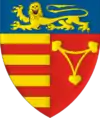Avrig
Avrig (Romanian pronunciation: [aˈvriɡ]; German: Freck/Fryck, Transylvanian Saxon: Freck/Fraek, Hungarian: Felek) is a town in Sibiu County, Transylvania, central Romania. It has a population of 12,815 and the first documents attesting its existence date to 1346. It officially became a town in 1989, as a result of the Romanian rural systematization program.
Avrig
| |
|---|---|
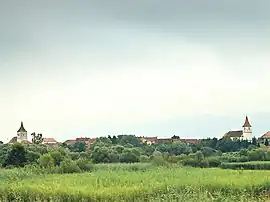 Panoramic view of Avrig/Freck | |
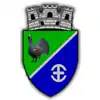 Coat of arms | |
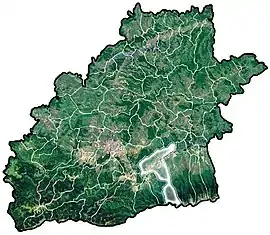 Location in Sibiu County | |
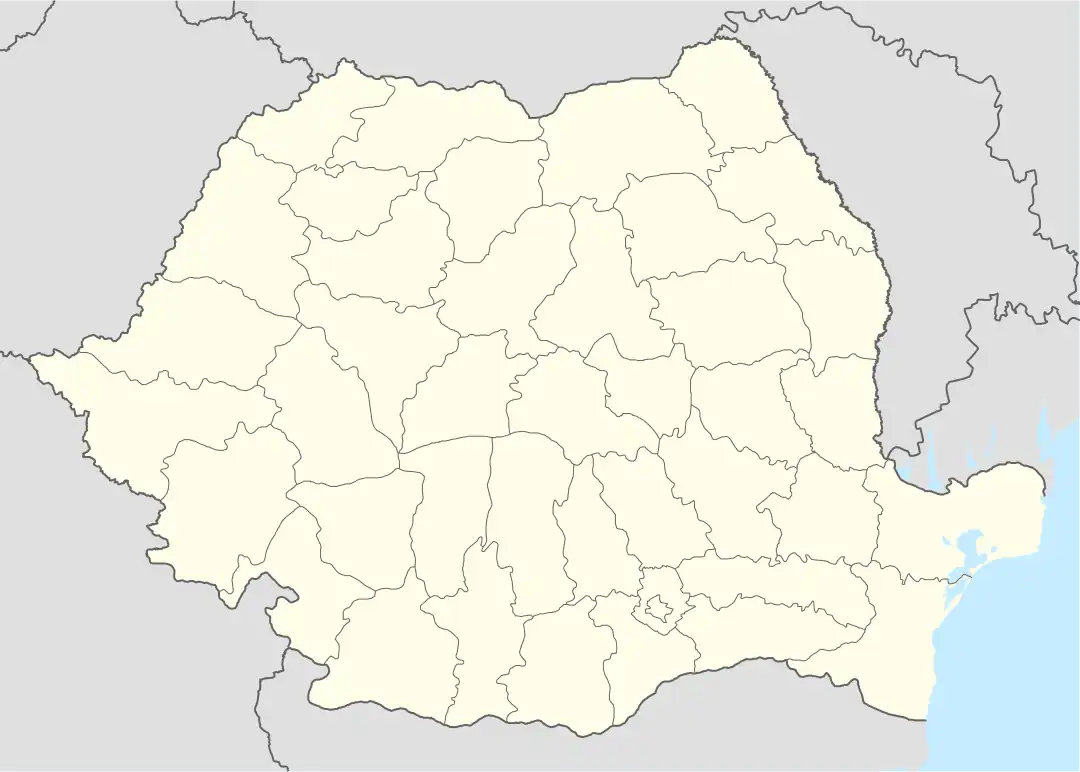 Avrig Location in Romania | |
| Coordinates: 45°42′29″N 24°22′29″E | |
| Country | Romania |
| County | Sibiu |
| Government | |
| • Mayor (2020–2024) | Adrian-Dumitru David[1] (PNL) |
| Area | 133.36 km2 (51.49 sq mi) |
| Population (2021-12-01)[2] | 12,534 |
| • Density | 94/km2 (240/sq mi) |
| Time zone | EET/EEST (UTC+2/+3) |
| Vehicle reg. | SB |
| Website | primaria-avrig |
Demographics
| Year | Pop. | ±% |
|---|---|---|
| 1992 | 14,965 | — |
| 2002 | 14,260 | −4.7% |
| 2011 | 12,815 | −10.1% |
| 2021 | 12,534 | −2.2% |
| Source: Census data | ||
At the 2011 census, 95.6% of inhabitants were Romanians, 2.1% Hungarians, 1.5% Roma, and 0.5% Germans (Transylvanian Saxons).
Administration and local politics
Town council
The town's current local council has the following multi-party political composition, based on the results of the votes cast at the 2020 Romanian local elections:[3]
| Party | Seats | Current Council | |||||||||
|---|---|---|---|---|---|---|---|---|---|---|---|
| National Liberal Party (PNL) | 9 | ||||||||||
| Democratic Forum of Germans in Romania (FDGR/DFDR) | 3 | ||||||||||
| Social Democratic Party (PSD) | 2 | ||||||||||
| People's Movement Party (PMP) | 2 | ||||||||||
| Independent (Spiridon-Gafon Ioan) | 1 | ||||||||||
Geography
The town administers four villages: Bradu (Gierelsau; Fenyőfalva), Glâmboaca (Hühnerbach; Glimboka), Mârșa and Săcădate (Sekadaten; Oltszakadát). It is situated in the historical region of Transylvania.
It lies on the left bank of the river Olt (at the mouth of the Avrig River), close to the Făgăraș Mountains, at about 26 km (16 mi) from Sibiu on the road towards Brașov. It is the main starting point for the trekking routes in the western part of the mountains, and also on access point at a great number of chalets in the mountains: Cabana Poiana Neamțului, Cabana Bârcaciu, Cabana Ghiocelul.
Economy
Avrig SA Glass Factory, a company specialized in lime mouthblown glass, started its origins in Avrig in the 17th century.[4]
Mârșa village is the site of the Mecanica Mârșa Works, which manufactures auto-trailers and military vehicles.[5]
Tourism
The most important objective in the town is the Brukenthal Summer Palace built in 1771, a baroque summer residence of baron Samuel von Brukenthal, the governor of Transylvania. Also two old churches can be found there: the evangelical church, built in the 13th century and fortified in the 16th century and the orthodox church, built in the 18th century.
Bradu village features a fortified church first attested in 1315, with the last major modification in 1804.
Natives
- Gheorghe Lazăr, founder of the first Romanian-language school
- Vasile Stoica, diplomat
Image gallery
 Brukenthal Summer Palace
Brukenthal Summer Palace Avrig
Avrig The medieval fortified Evangelical Lutheran Transylvanian Saxon church of Avrig
The medieval fortified Evangelical Lutheran Transylvanian Saxon church of Avrig The medieval Evangelical Lutheran Transylvanian Saxon fortified church of Bradu village
The medieval Evangelical Lutheran Transylvanian Saxon fortified church of Bradu village_25.jpg.webp)
 Avrig in the Grand Duchy of Transylvania, 1769-1773
Avrig in the Grand Duchy of Transylvania, 1769-1773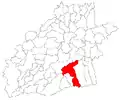 Avrig in Sibiu County
Avrig in Sibiu County
References
- "Results of the 2020 local elections". Central Electoral Bureau. Retrieved 14 June 2021.
- "Populaţia rezidentă după grupa de vârstă, pe județe și municipii, orașe, comune, la 1 decembrie 2021" (XLS). National Institute of Statistics.
- "Rezultatele finale ale alegerilor locale din 2020" (Json) (in Romanian). Autoritatea Electorală Permanentă. Retrieved 2020-11-02.
- "Archived copy". Archived from the original on 2020-07-16. Retrieved 2018-05-11.
{{cite web}}: CS1 maint: archived copy as title (link) - "Umem". Archived from the original on 2018-05-25. Retrieved 2018-05-11.
External links
- Avrig Town Hall Official Site (in Romanian)
- Brukenthal Palace Avrig
